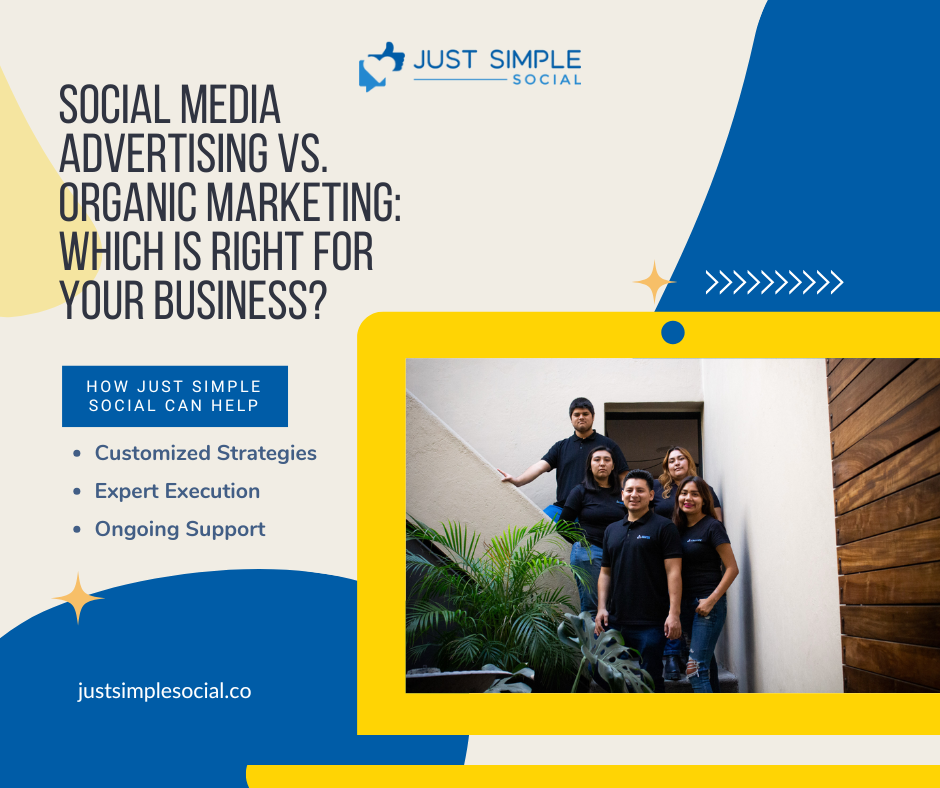
In the fast-paced world of digital marketing, businesses often find themselves at a crossroads when deciding between social media advertising and organic marketing. Both strategies offer unique benefits, but choosing the right approach can significantly impact your brand’s online presence and growth. In this article, we’ll explore the differences between social media advertising and organic marketing, helping you determine which strategy aligns best with your business goals.
Understanding Social Media Advertising
Social media advertising involves paid promotions on platforms like Facebook, Instagram, Twitter, and LinkedIn. These ads are designed to reach a specific audience, driving traffic, engagement, and conversions.
Key Features of Social Media Advertising:

Targeted Reach: Ads can be tailored to specific demographics, interests, and behaviors, ensuring your message reaches the right audience.
Immediate Results: Unlike organic marketing, paid ads can generate quick results, making them ideal for time-sensitive campaigns.
Scalability: Budgets can be adjusted based on performance, allowing for flexible spending.
Measurable ROI: Detailed analytics provide insights into ad performance, helping to refine strategies.
Benefits of Social Media Advertising:
Increased Visibility: Paid ads can boost brand visibility, even in competitive markets.
Enhanced Engagement: Interactive ad formats encourage user interaction, fostering brand loyalty.
Lead Generation: Effective in driving traffic to landing pages and generating leads.
Potential Drawbacks:
Cost: Requires a financial investment, which can be significant depending on the campaign scale.
Ad Fatigue: Overexposure to ads can lead to decreased engagement over time.
Understanding Organic Marketing

Organic marketing focuses on building a brand’s presence naturally over time through content creation, community engagement, and SEO.
Key Features of Organic Marketing:
Content-Driven: Relies on high-quality, relevant content to attract and engage audiences.
Community Building: Encourages genuine interactions and relationships with followers.
Long-Term Strategy: Results develop over time, contributing to sustained brand growth.
Benefits of Organic Marketing:
Cost-Effective: Primarily relies on time and effort, with minimal financial investment.
Authenticity: Builds trust and credibility through genuine interactions and valuable content.
Sustainable Growth: Contributes to long-term brand loyalty and recognition.
Potential Drawbacks:
Time-Consuming: Requires consistent effort and patience to see significant results.
Limited Reach: May struggle to reach new audiences without the aid of paid promotions.
Deciding Which Strategy is Right for Your Business

Choosing between social media advertising and organic marketing depends on several factors, including your business goals, budget, and target audience.
Consider Your Business Goals:
Immediate Results: If your goal is to quickly boost sales or promote a new product, social media advertising is likely the better choice.
Brand Building: For businesses focused on establishing a strong brand identity and community, organic marketing is essential.
Evaluate Your Budget:
Financial Resources: If budget constraints exist, organic marketing offers a cost-effective alternative.
Investment Willingness: Businesses with a larger marketing budget can leverage both strategies for maximum impact.
Understand Your Audience:
Demographic Insights: Use audience data to determine which platforms and strategies your target market engages with most.
Engagement Preferences: Consider whether your audience prefers authentic content or responds well to targeted ads.
Integrating Both Strategies for Maximum Impact

For many businesses, a hybrid approach that combines both social media advertising and organic marketing yields the best results.
Benefits of a Hybrid Approach:
Balanced Growth: Achieve immediate visibility while building long-term brand loyalty.
Comprehensive Reach: Engage with both existing followers and new potential customers.
Optimized Budget: Allocate resources efficiently across both strategies to maximize ROI.
Implementing a Hybrid Strategy:
Content Calendar: Plan a mix of organic posts and paid promotions to maintain a consistent online presence.
Cross-Promotion: Use organic content to support ad campaigns and vice versa, creating a cohesive brand message.
Analytics and Adjustments: Regularly review performance metrics to refine both organic and paid strategies.
How Just Simple Social Can Help

At Just Simple Social, we specialize in crafting tailored digital marketing strategies that align with your unique business needs. Our team of experts will work closely with you to determine the best mix of social media advertising and organic marketing, ensuring your brand achieves its online goals.
Our Approach:
Customized Strategies: We analyze your business objectives and target audience to create a personalized marketing plan.
Expert Execution: Our experienced team manages all aspects of your campaigns, from content creation to ad optimization.
Ongoing Support: We provide continuous monitoring and adjustments to ensure your strategy remains effective and relevant.
Ready to elevate your digital marketing efforts? Contact Just Simple Social today to schedule a consultation and discover how our integrated approach can drive success for your business.